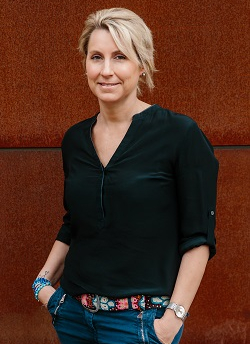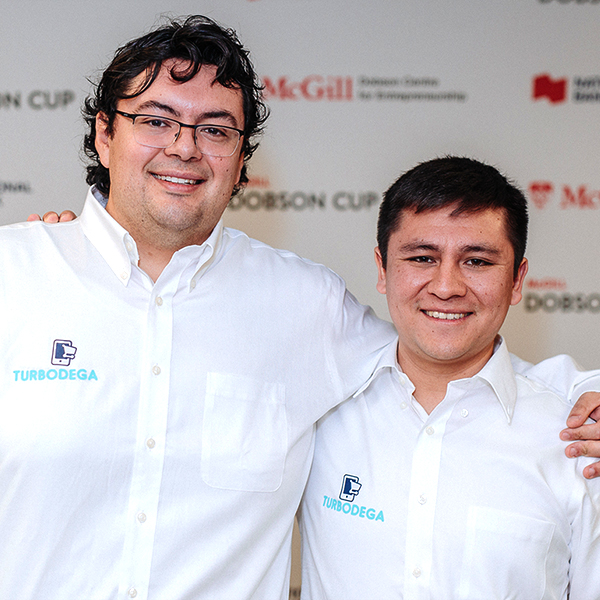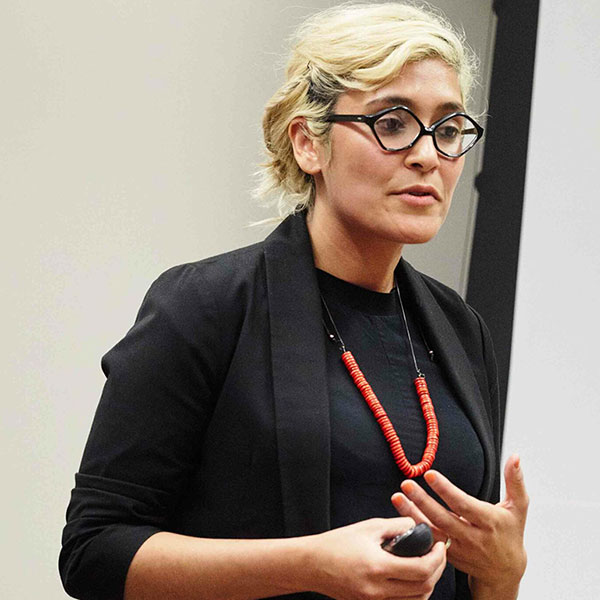The idea came to Nancy Mayo after years of trying to teach clients how to walk better.
“One thing physiotherapists say all the time is: Put your heel down first,” says Mayo. “As a clinician, I had a lot of experience with that. But once you stop working with the patient, they just revert back.”
Trained as a physiotherapist, Mayo is a James McGill Professor in the Department of Medicine and the School of Physical and Occupational Therapy. She’s also a research scientist with the Research Institute of the McGill University Health Centre, where she explores function, disability, and quality of life for vulnerable populations.
Sharing a taxi back from a research conference, it came to her. “I said to the others, wouldn’t it be amazing if we had something that beeped when people put their heel down, so we don’t have to be there at every step?”
Fast forward nine years and Mayo is president and co-founder of PhysioBiometrics, a McGill start-up developing products to help people move better — including the Heel2Toeᵀᴹ sensor, a wearable device paired with a mobile app that encourages proper movement while walking. The company won first place in the health sciences category at the 2020 McGill Dobson Cup competition.
And in December 2021, PhysioBiometrics won the top $100,000 award from the new McGill Innovation Fund. With no strings attached, the award goes to McGill projects that have begun commercialization and have the potential to do well. Winning projects are also matched for a year with a team of McGill alumni, experts in their respective fields.
“This award is helping us move from start-up to ramp-up,” says co-founder Ted Hill, a technology analyst with a doctorate in software engineering. He says that PhysioBiometrics will have a fully realized device ready to go this fall. “It’s a winner and I’m investing my eggs in this basket.”
Another eureka moment
Mark Weber, BEng’87, MEng’89, PhD’96, the director of McGill’s Office of Innovation and Partnerships, had his own eureka moment that led to the launch of the McGill Innovation Fund in September 2021.
Working at McGill for the past 10 years, Weber often saw promising projects come and go, as they tried to make it out of the dreaded “valley of death” — the phase when scientific research takes the step toward commercialization, is no longer eligible for funding from granting agencies, but isn’t yet viable enough to attract investors.
His office was already offering access to mentoring, coaching, and networking to help bridge the gap between research and commercialization. “Then it hit me one day: it’s the funding we’re missing,” says Weber. “Until that gap is solved, we’d still have these good companies that were floundering or treading water.” The expert advice was crucial, but so was the need for that funding support.
He pitched the idea to McGill alumni around the world and gathered a cohort of graduates who could serve as judges, advisors, and mentors for the new fund and its recipients. A donation from David R. Holbrooke, BSc’64, MDCM’69, supplied pivotal momentum for the first year. On September 28, 2021, the McGill Innovation Fund was officially launched in tandem with McGill’s Bicentennial.
The fund offers awards in three categories: “Pre-launch” at $25,000, “Launch pad” at $50,000, and “Blastoff” at $100,000 (the category names will soon change to Discover, Develop, and Deploy). Applications are welcome from any McGill faculty or department, as long as they have a report of invention with the Office of Innovation and Partnerships.
In all, nine prizes were awarded in the first year, for a total pool of nearly $500,000, making it the biggest fund of its kind at McGill and one of the biggest in Canada.
“Nothing goes quickly in science”

The money can be spent any way the recipient wants. But the best part of being among the winners, according to Sarah Kimmins, is being matched with an advisory committee of knowledgeable experts. Her project, HisTurn, won the $25,000 pre-launch award, which goes to projects that have demonstrated a proof of concept in a controlled or laboratory setting.
Kimmins values the regular meetings with a committee of specialists, who have backgrounds ranging from patenting to marketing to venture capital. “That’s the most important part of this award,” she says.
Kimmins is McGill’s Canada Research Chair in Epigenomics, Reproduction and Development, an associate professor in the Department of Animal Science, and an associate member of the Department of Pharmacology and Therapeutics. Her area of research is epigenetics, with a focus on male infertility.
She explains that male infertility has risen over the past 40 years, for reasons such as environmental factors, an increase in obesity, and couples waiting later in life to have children. (Contrary to popular belief, male fertility does decline with age, notes Kimmins.) And while up to half the cases of infertility in couples can be attributed to the male, semen analysis is still based on a 50-year-old method.
Her team is developing a diagnostic that would accurately detect infertility in men. Unique in the world, this new tool could spare many women the discomfort, stress and side effects of expensive fertility treatments that very often do not work. “We have this inequality of care in treating infertility,” says Kimmins. “It places a huge health burden on women.”
Did Kimmins have her own eureka moment? Not really. Her project is the result of research she and her team have undertaken since she arrived at McGill in 2005. “It’s been a long, slow process. Nothing goes quickly in science,” says Kimmins with a smile. “But I realized we have something that could be quite important for diagnosing infertility and there’s a real need for it.”
She notes the fertility market is projected to be worth in the billions of dollars over the coming few years. Her long-term hope is for the diagnostic to be a simple, affordable test that saves couples a lot of time, money, and uncertainty.
Figuring out the next steps
With a background in venture capital, Bobbi Bidochka, BA’11, is one of the advisors for HisTurn.
“McGill has great biomedical researchers working on projects of commercial value,” says Bidochka. “It’s sitting on a gold mine.” However, she points out that biomedical start-ups have additional obstacles to navigate, including the need for clinical trials. She and other McGill advisors help Kimmins locate funding sources, make intellectual property decisions, and decide on who her market will be, among other topics.
“We’re surrounding Sarah with all the things she needs,” says Bidochka, “and helping her figure out the next steps.”
Frances Arthur, BA’90, is one of the advisors to PhysioBiometrics — helping them figure out their next steps, both literally and figuratively. Once she learned of the company’s mission to help people walk better, Arthur was drawn in. “I’m a huge walker,” she says. “This is a product I can believe in.”
The regional recruitment head (North America) at SNC Lavalin, Arthur offers her HR expertise to PhysioBiometrics. She sees her role as asking the right questions and helping them find the right people for their company to succeed.
Arthur emphasizes there’s a reward for her, too. “It makes your career worthwhile,” she says. “These are brilliant people trying to make a difference. I want to be part of that.”
This September, the McGill Innovation Fund launched its second year, with an announcement that Marc Boghossian, BCom’93, will be providing funding for a new bi-annual green tech award of $40,000.
Further support is needed to ensure the long-term viability of the McGill Innovation Fund, says Mark Weber. He hopes more alumni will get involved in many ways, and he likens the advisory meetings to master classes in how to launch a start-up. “It’s phenomenal to watch the enthusiasm and loyalty of our alumni advisors,” he says. “And it’s noticeable that the award recipients are truly grateful for the advice and expertise they’re receiving.”
Weber hopes to expand that access to mentorship. “Even for those who don’t get the funding, we want to give them more opportunities for networking,” says Weber. “We’re really trying to grow the whole ecosystem.”

